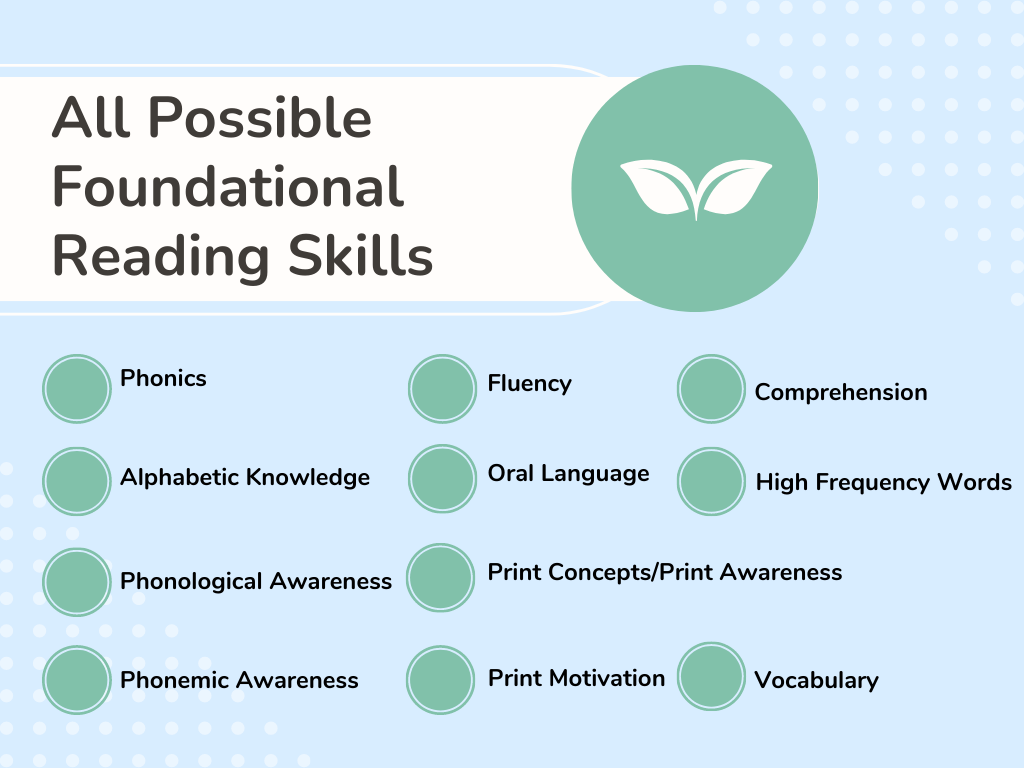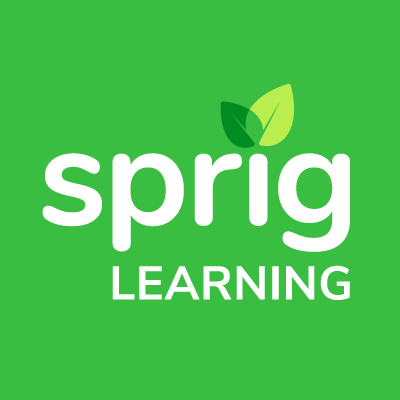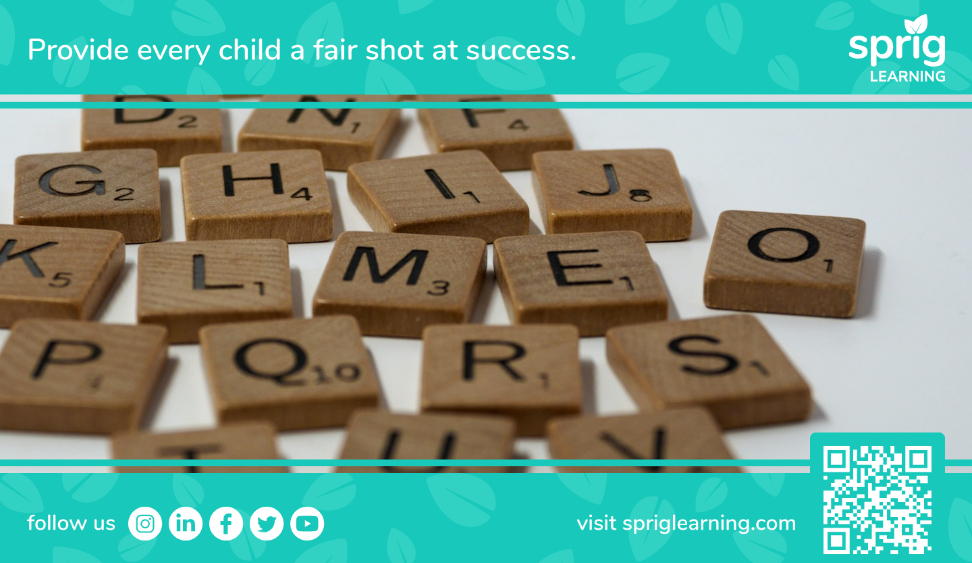The acquisition and mastery of foundational reading skills are essential in a child’s journey towards becoming a proficient reader.
These skills serve as the building blocks for successful reading comprehension and are essential for future academic success.
A lot of the new wave of evidence-based or structured literacy movement is based on the principles of explicitly and systematically teaching all of the foundational skills.
Some common arguments against evidence-based or structured literacy arise from an insufficient understanding of what the foundational skills are, and what each skill entails.
In this blog post, Sprig Learning will explore all of the foundational reading skills that lay the groundwork for early literacy development.
There will be overlaps between certain foundational skills, but we purposefully wanted to list all skills identified in the research to demonstrate the richness of the instructional area that is covered by them.
Hopefully, the arguments against evidence-driven early literacy will be resolved, as those arguments often mention the lack or absence of certain skills that are, in fact, already a part of foundational reading skills! Understanding the complete scope of these skills reveals how they encompass everything related to early literacy.
Thus, it’s very important to be clear on what exactly are the foundational skills.
Each skill will be listed and defined in the following section, stating why they are foundational, and identifying the evidence linking them to reading success.
Foundational Reading Skills Defined

Phonics
Phonics is the understanding that there is a predictable relationship between phonemes (sounds) and graphemes (letters and letter combinations).
It involves decoding words by connecting sounds to their corresponding letters or letter patterns.
Why Foundational and What Evidence?
Understanding phonics enables children to understand the relationships between the letters of written language and the sounds of spoken language. Phonics supports children to decode unfamiliar words, leading to improved reading fluency and comprehension.
Research has consistently shown that explicit phonics instruction is effective in improving reading accuracy and decoding skills.
Phonemic Awareness
Phonemic awareness refers to the ability to identify and manipulate individual sounds (phonemes) in spoken words. It is a specific aspect of phonological awareness that focuses solely on individual phonemes.
It involves recognizing and manipulating phonemes through activities like segmenting, blending, and manipulating sounds.
Why Foundational and What Evidence?
Phonemic awareness plays a crucial role in early literacy development and has been identified as a strong predictor of reading success.
Research suggests that phonemic awareness instruction significantly improves children’s reading and spelling abilities. By developing phonemic awareness, children gain the skills needed for successful phonics instruction and word decoding.
Phonological Awareness
Phonological awareness is a broad term that encompasses the understanding and recognition of various units of sound in spoken language.
It involves the understanding and manipulation of larger units of sound in spoken language, including syllables, onset and rime, and individual phonemes. It includes skills such as rhyming, segmenting and blending sounds, and manipulating sounds within words.
Why Foundational and What Evidence?
Developing phonological awareness skills facilitates phonemic awareness, phonics, and reading fluency.
Research has consistently shown that phonological awareness is a strong predictor of early reading success.
Vocabulary
Vocabulary refers to the words known and understood by a child.
A robust vocabulary enables children to comprehend written text and express themselves effectively.
Why Foundational and What Evidence?
Vocabulary contributes to reading comprehension and overall language development.
Numerous studies have established a positive relationship between vocabulary knowledge and reading comprehension.
Fluency
Fluency encompasses the ability to read text accurately, quickly, and with appropriate expression.
Fluent readers read effortlessly, allowing them to focus on understanding the meaning of the text.
Why Foundational and What Evidence?
Fluency enables readers to process text effortlessly, leading to improved comprehension and overall reading proficiency.
Research has consistently shown that fluent reading is associated with improved reading comprehension. Fluent readers can focus on comprehension and meaning rather than decoding individual words.
Comprehension
Comprehension is the ultimate goal of reading. It involves understanding and making meaning from the text.
Comprehension skills include activating prior knowledge, making predictions, identifying main ideas, making inferences, and summarizing.
Why Foundational and What Evidence?
Developing comprehension skills enables children to engage with and critically analyze texts, enhancing their overall reading proficiency.
Research has shown that explicit instruction in comprehension strategies improves reading comprehension outcomes.
Print Concepts/ Print Awareness
Print concepts refer to the understanding of how print works, including concepts such as left-to-right and top-to-bottom directionality, word spacing, and punctuation.
Developing print concepts helps children navigate written text and understand the structure and organization of written language.
Why Foundational and What Evidence?
Print concepts provide children with a framework for understanding the structure and organization of written language.
Research indicates that developing print concepts enables children to navigate written text successfully.
Alphabetic Knowledge
Alphabetic knowledge refers to the understanding that letters represent sounds.
It involves recognizing and naming uppercase and lowercase letters and understanding their corresponding sounds.
Why Foundational and What Evidence?
By mastering alphabetic knowledge, children can effectively decode and encode words, laying the foundation for reading success.
Research has shown that strong alphabetic knowledge is associated with improved reading and spelling abilities.
High Frequency Words
High frequency words are words that appear frequently in written text.
Mastery of high frequency words is important because these words are encountered most often in the text and play a significant role in reading fluency and comprehension.
Why Foundational and What Evidence?
Recognizing high frequency words quickly and automatically enhances reading efficiency and allows readers to focus on decoding more complex words.
Research suggests that high frequency word recognition is associated with improved reading efficiency and comprehension.
Oral Language
Oral language refers to the ability to understand and use spoken language effectively.
It includes a host of skills, such as vocabulary, sentence structures, grammar, listening skills, oral fluency, verbal reasoning, etc.
Why Foundational and What Evidence?
Strong oral language skills serve as the foundation for reading and writing. Children with a rich oral language background have a better understanding of vocabulary, sentence structures, and grammar, which aids in reading comprehension.
Moreover, oral language skills support phonemic awareness and phonics development by exposing children to a variety of sounds and word patterns.
Research indicates a robust link between oral language skills and reading comprehension.
Print Motivation
Print motivation refers to a child’s interest, motivation, and enjoyment of books and reading.
By nurturing print motivation, individuals develop a lifelong love for reading and are more likely to become proficient readers.
Why Foundational and What Evidence?
Print motivation plays a significant role in fostering a positive attitude towards reading and a genuine desire to engage with printed material.
Higher levels of print motivation have been linked to greater reading achievement in children, according to research findings.
All Encompassing Foundational Reading Skills Overturning Common Arguments

Let’s now visit some of the common arguments made against evidence-based literacy. The richness and vastness of all of the foundational reading skills make for easy rebuttals.
- “Evidence-based literacy approaches are too rigid and limit teacher autonomy and creativity.”
Evidence-based literacy approaches provide a framework based on research and proven practices, but they also allow for teacher flexibility and creativity within that framework.
These frameworks are in fact not rigid at all, due to the sheer number of reading sub skills that they cover as a part of the foundational reading skills.
Of course, teachers must still tailor instruction to meet the diverse needs of their students. That’s where formative assessment comes into play, where students’ level of understanding and need for practice can be tracked regularly and used to drive instruction.
- “Evidence-based literacy is too focused on phonics”
This is simply not true. Phonics is, after all, just one skill set out of the 11 mentioned here.
Even if we look at all the skills that support decoding, such as alphabet knowledge, phonics, phonological awareness, and phonemic awareness, there are still 7 other foundational skills that lead to reading comprehension.
- “Evidence-based literacy does not take into account the practice of reading, nor the background knowledge required to read.”
While it is true that the explicit instruction of foundational reading skill sets is emphasized, many of these skills specifically focus on reading practice and developing the background knowledge necessary to read.
Print concepts and print motivation ensures that students familiarize themselves with books and discover the joy of reading.
Vocabulary and reading comprehension ensures that students develop contextual knowledge and are able to understand the texts being read.
Hence, developing background knowledge and cultivating a love for reading are critical to any evidence-based foundational reading skills framework.
Using a Framework That Considers All of the Foundational Reading Skills
By understanding the foundational reading skills, schools, organizations and educators can devise a comprehensive reading strategy that focuses on each learning area.
Such deliberate inclusion of all the foundational reading skill sets ensures students will become proficient readers!
By implementing an explicit and systematic reading approach and developing an appropriate assessment strategy for each skill, educators can effectively provide targeted support and interventions to struggling readers who need the additional help beyond core instruction.
By using a comprehensive framework that encompasses all the foundational skills mentioned, we can implement a reading strategy that is widely recognized for its effectiveness in improving reading proficiency.

